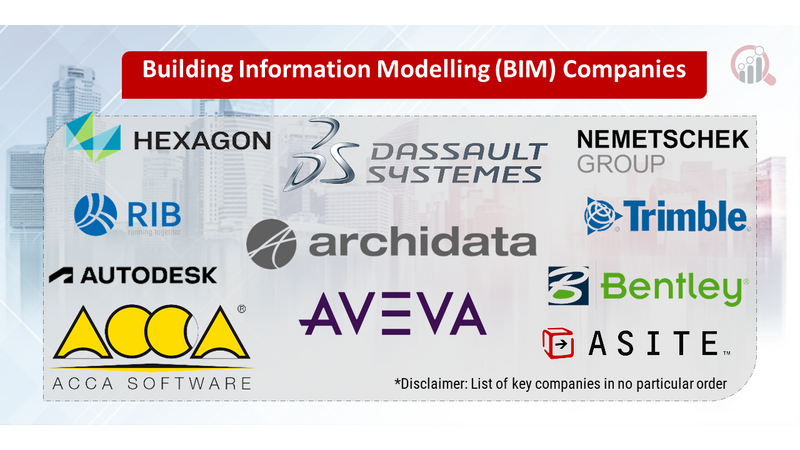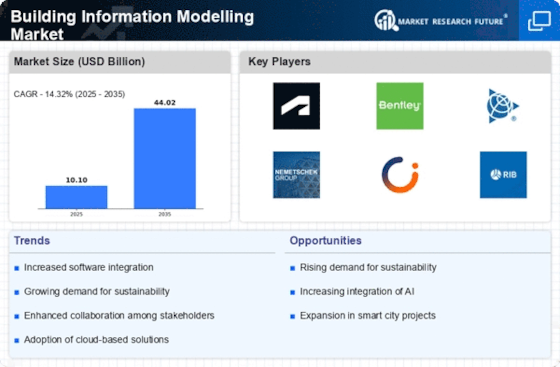Top Industry Leaders in the Building Information Modelling Market

Competitive Landscape of Building Information Modelling Market:
The Building Information Modelling (BIM) market is experiencing a surge, fueled by its potential to revolutionize the construction industry. Driven by factors like increased efficiency, cost reduction, and improved collaboration, the market is projected to reach a staggering USD 15.0 billion by 2028, registering a CAGR of 13.7%. This growth presents exciting opportunities, but also a dynamic and competitive landscape. Let's delve into the key players, strategies, and trends shaping this burgeoning market.
Key Players:
- Autodesk Inc.
- Hexagon AB
- Trimble Inc.
- Dassault Systemes SA
- Nemetschek SE
- Bentley Systems
- Aveva Group PLC
- Rib Software SE
- Archidata Inc.
- Procore Technologies, Inc.
- Arcadiasoft
- Acca Software
- Beck Technology Ltd
Strategies Adopted:
- Global Giants: Established players like Autodesk (Revit), Bentley Systems (MicroStation), and Trimble (Tekla) dominate the market with their comprehensive solutions, extensive experience, and strong brand recognition. They focus on continuous product development, incorporating cutting-edge technologies like AI and cloud-based platforms, to maintain their leadership.
- Specialized Players: Companies like Graphisoft (ArchiCAD) and Nemetschek (Vectorworks) cater to specific niches within the BIM ecosystem, offering specialized software for architectural design and facility management. Their focus on user-friendliness and niche expertise helps them carve out a loyal customer base.
- Emerging Disruptors: Start-ups like B2i and PlanGrid are shaking up the market with innovative solutions. B2i offers a cloud-based platform for construction project management, while PlanGrid simplifies field collaboration through its mobile app. These agile companies leverage their flexibility and focus on user-centric design to gain traction.
Factors for Market Share Analysis:
- Product Portfolio: The breadth and depth of a company's BIM software offerings play a crucial role. A comprehensive portfolio catering to different project types and user segments can secure a larger market share.
- Technological Innovation: Continuous investment in research and development, integration of AI and cloud technologies, and open-BIM compatibility are crucial for staying ahead of the curve.
- Regional Presence: Strong presence in key markets like North America, Europe, and Asia-Pacific is essential for global market share dominance.
- Partnerships and Collaborations: Strategic partnerships with construction companies, educational institutions, and government agencies can expand reach and enhance brand visibility.
New and Emerging Companies:
The BIM market is witnessing a continuous influx of new players, each with unique offerings:
- Solibri: This Finnish company specializes in BIM quality control and clash detection software, ensuring project accuracy and efficiency.
- Trimble Viewpoint: This cloud-based platform offers construction project management, real-time data visualization, and field collaboration tools, simplifying project oversight.
- Proptech Startups: Companies like Built-ID and Buildots are applying blockchain technology to construction, enhancing transparency and trust in the supply chain.
Current Company Investment Trends:
- Cloud-based Solutions: The shift towards cloud-based BIM platforms is accelerating as companies recognize their advantages in scalability, accessibility, and real-time collaboration.
- Interoperability and Open Standards: Focus is increasing on open-BIM standards and interoperability between different software solutions, enabling seamless data exchange and collaboration across the project lifecycle.
- Vertical Market Specialization: Companies are tailoring their offerings to specific segments like healthcare, infrastructure, and facility management, catering to unique needs and workflows.
- Integration with AI and Machine Learning: AI is being incorporated into BIM software for tasks like automatic clash detection, generative design, and construction site optimization.
Latest Company Updates:
Following the announcement of its most recent partnership with Revizto, OpenSpace, a leader in 360-degree reality capture and AI-powered analytics, has announced the launch of OpenSpace BIM+ in 2023. By enabling BIM coordination on site, OpenSpace BIM+ is a set of simple-to-use 3D tools that assist field teams and virtual design and construction (VDC) teams in finishing their work more quickly.
The leading provider of Building Information Modelling (BIM) software solutions for architectural and transdisciplinary design, Graphisoft, announced today the addition of major feature enhancements to Archicad, BIMcloud, BIMx, and DDScad to its newest product portfolio for 2023. The news comes after a comprehensive Technology Preview Programme that allowed customers to provide feedback on how Graphisoft's flagship product, Archicad, should develop.
At the Autodesk University trade exhibition in the previous year, Forma was introduced as a stand-alone cloud in 2023 that would integrate with all of the technology giant's engineering, building, and architecture workflows. The planning phase is still at the forefront of what Autodesk has released; design tools like AutoCAD and Revit can integrate Forma's data output without requiring adjustments to their current workflows.











